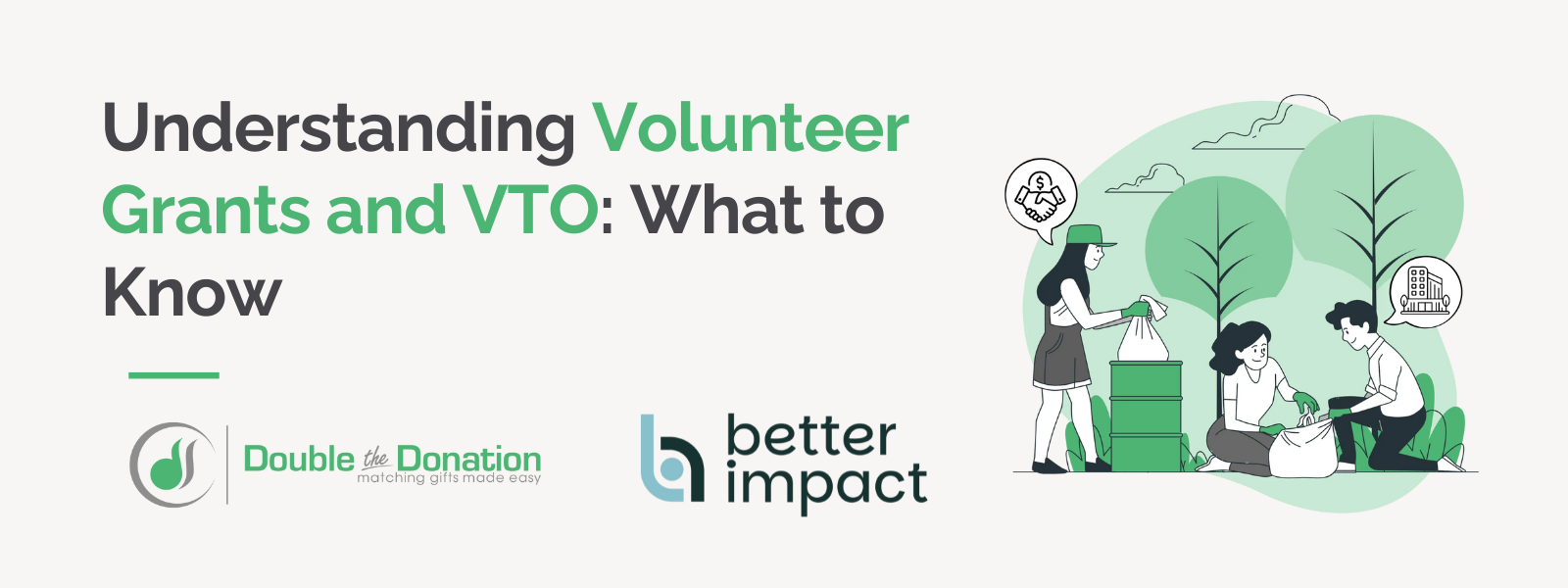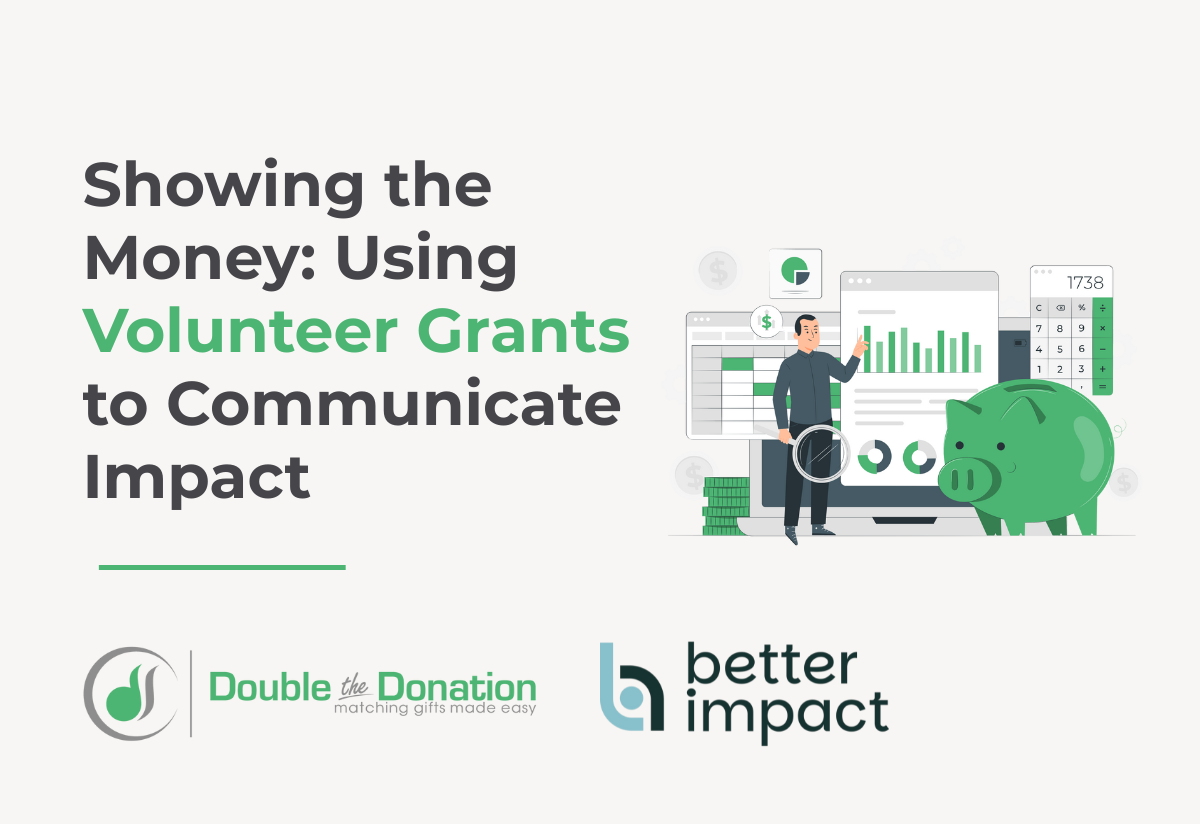Understanding Volunteer Grants and VTO: What to Know
In the realm of volunteer management, programs like volunteer grants and Volunteer Time Off (VTO) are becoming increasingly significant. These...
4 min read
 Team Better Impact
May 29, 2023 9:53:54 AM
Team Better Impact
May 29, 2023 9:53:54 AM

As a nonprofit professional, you understand how important your volunteer base is to achieving your organization’s mission. Volunteers provide their time, energy and passion in exchange for seeing your mission grow. Your organization likely already has a dedicated volunteer network, but have you considered taking your volunteer base to the next level by tapping into corporate volunteering?
A corporate volunteer program is a partnership between a company and a nonprofit in which the company’s employees work towards improving the community. Corporate volunteers can provide an extra leg-up in running your programs, streamlining your marketing strategies and meeting your most pressing needs, allowing your nonprofit to achieve its goals quickly and more efficiently.

With a strong framework in place, corporate volunteers can take your organization to new heights. In this guide, we’ll take a closer look at the major benefits of setting up a corporate volunteering program, including:
When looking for a corporate partner, make sure the business aligns with your nonprofit’s values and is passionate about your goals. This will translate into positive, productive corporate volunteer relationships that you can count on year-round. With that in mind, let’s explore the major benefits of a well-designed corporate volunteering program.
Corporate volunteers bring a specialized skill set from their working backgrounds into their volunteer roles. This can help your nonprofit in a variety of ways, from supporting your fundraising efforts to bolstering your marketing strategy.

For example, let’s say your organization decides to partner with a graphic design company. Corporate volunteers from this company can support your organization by designing engaging marketing materials for email campaigns, social media and your nonprofit’s website. With their expertise, they can help you form a cohesive strategy that stays true to your brand and allows you to expand your reach online, bringing in more donations.
In turn, your organization is able to save time and resources that would otherwise go into hiring a new staff member or training volunteers from your traditional volunteer program to learn these new skills. If there’s a particular niche your nonprofit needs added support in and would benefit from skilled volunteers, use this as a guiding force when looking for a corporate partner.
When volunteers work at your nonprofit, they become passionate proponents of your cause and are likely to spread the word about your organization among their friends, family members and other individuals in their personal networks. The same can be said for your corporate volunteers.
As your organization expands its volunteer network to employees at a company, you’ll grow your visibility among all workers, from senior executives to team members working in all different types of departments. In turn, they’ll help expose your organization to their client base, other professionals in their network that can lend a hand and individuals in their personal networks that would be eager to support your cause.
Plus, your corporate partner will likely add your nonprofit to its website, social media channels and other marketing materials in an effort to establish itself as a socially-conscious brand. This can provide a number of benefits for your organization, allowing you to reach more prospective supporters than ever before and bring attention to your important programs, events and fundraising campaigns.
Many corporate partners will double their impact by offering donations to your organization on top of volunteer hours. For example, a corporate partner might give the following types of support:
To further encourage volunteering, your corporate partner could also offer volunteer time off (VTO). Volunteer time off gives employees a break from work and allows them to engage more deeply with your organization. If your corporate partner offers volunteer grants along with VTO, this gives your nonprofit a great opportunity to bring in even more funding.
As you kickstart a corporate volunteering program, your corporate partner may offer other ways they can increase their impact. For example, a company can extend their support through supplying in-kind donations like equipment or marketing your organization through their own promotional campaigns and communications.

To set your partnership up for success and promote its health over the long-term, keep the following tips in mind:
With a clear strategic plan, both your nonprofit and its partner will be satisfied, allowing both parties to reap the benefits for years to come.
Corporate volunteering can make a significant impact on your nonprofit’s ability to meet its goals. If you’re wondering how to naturally fit corporate volunteering into your plans, work with a consultant. According to Aly Sterling Philanthropy, an outside expert can take a deep dive into your organization and determine how to best structure your corporate volunteering program, ensuring that it aligns with your values and goals. Backed by a nonprofit consultant, you can design a winning corporate volunteer program. Good luck!
Featured Posts

In the realm of volunteer management, programs like volunteer grants and Volunteer Time Off (VTO) are becoming increasingly significant. These...

Volunteers are often the unsung backbone of nonprofit operations, doing essential work behind the scenes. But how do you bring that value to the...

Dedicated volunteers give your nonprofit the momentum to move its mission forward. With their time, talents, and energy, your volunteers help you...